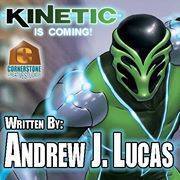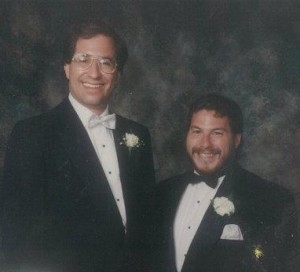Apr 11 2016
Interview with Andrew J Lucas

Part three of a series of interviews with the writers for the upcoming speculative fiction anthology, Clash of the Titles. the anthology is the brain child of Glen Bavel, who conceived of an endearing conceit: he would provide a list of titles and the members of his Facebook workshop, Writing the Short (SF) Story, would use the it as a starting point for a short speculative fiction story.
Andrew J. Lucas’s story, “The End of the Line” takes place in the far, distant future where industrial smelters orbit black holes using the peculiarities of Quantum Mechanics to create indestructible construction supplies. Something goes wrong and the lives of two men are ripped apart on a physical, emotional and atomic level. Then the story really gets going…
Recently, I had the opportunity to talk with Andrew about his writing career and, in particular, his participation in the upcoming anthology, Clash of the Titles.
First, how did you get into writing? How did you get started?
I guess I’ve been writing since 1980. My first serious publication was when I won the Okanagan College poetry contest in 1986. While I’ve always loved poetry, especially Al Purdy’s, my real heart’s passion is roleplaying games and science fiction. I’ve written 10 solo books for various RPG publishers and contributed to dozens of other books. I’ve also written many short fiction stories, as well as comic scripts. I am most proud of my first RPG book Northwest Passage, and the short story I had published recently in the anthology A Bleak New World.
What draws you to the Sceince Fiction/Role Playing genre?
I grew up watching Star Trek, Doctor Who and Thunderbirds like most British-Canadian kids of my era. I was entranced by visions of the future and subscribed to magazines like Starlog and Future. I even paid for them myself with my paper route money, which only endeared them all the more to me. Those magazines promised a bright, shiny, attractive future, and even though my fiction leans towards the dystopic, I do love ‘what ifs.’
So, who’s your favorite writer, your role model?
That’s a tough question. There are so many good writers out there. Among the old masters I’d have to say that Robert Heinlein and Isaac Asimov are my favorites. There are also a couple of contemporary authors whose work really strikes a chord with me. I can’t get enough of Neil Gaiman and John Scalzi, for instance.
How did you find out about the anthology, Clash of the Titles?
I think a notification came across my Facebook feed, possibly in an open call group for science fiction, fantasy and pulp markets. One of those closed groups that only published author can join, while it certainly boosted my self-esteem, I’ve also found some nice markets there.
What made you want to submit to it? Would you do it again?
The whole concept of the anthology was appealing. It reminded me of an anthology by John Scalzi called Rip-Off which featured well known authors using famous opening lines from fiction. It’s very interesting to see how an author takes a concept in very different directions than you might otherwise expect.
How did you come up with your story? What made you choose that title?
My story; “The End of the Line” was inspired by a non-fiction science article I was writing about quantum computing for a Chinese science magazine. The whole concept of quantum mechanics is very intriguing and a little bit scary.
How is your story for the anthology the same and/or different from your other works?
It’s hard to tell from the writer’s perspective if anything I write is different or unusual. Much of my work is very different from other pieces I’ve written this is no exception. I did take a lot of direction from Gil, the editor, and I think the story evolved and became much stronger from his influence.
A lot has been said about the workshop process wherein the editor takes a video meeting with the writers to help offer instant feedback and share the editing process along the way. How did you find this process; what are your feelings about it?
I’ve always preferred to use email and such to discuss edits and story direction, its slower and gives you time to put revisions into place. That said the workshop process was rewarding and reminded me a bit of my Canadian lit classes in College.
What do you think is the most important thing that readers know about Clash of the Titles?
Expect a lot of creativity. The titles were pretty arbitrary, but, man, were there a lot to choose from and all the writers went to town on them.
It’s said that the editor will make an anthology every year. Even if the “I pick the titles, you write the story” conceit isn’t used again, would you work with the editor again? Why or why not?
I learnt a lot from the editor’s feedback, and I am always up to participate in a project that is interesting. I’d be thrilled to be included in a second anthology no matter the topic, but the competition is pretty tough and you can never rest on your laurels. If my next story is good enough it might make the cut, but I’d expect to be up against some fierce competition.
What do you think is the most important thing for booksellers, libraries and other outlets to know about Clash of the Titles that they don’t know?
Quality and creativity. You give your writers a pure creative challenge and you will get some wondrous results.
Would you recommend the process to other writers; how did you find working with this editor to be compared to others?
Absolutely, but you need to check your assumptions at the door, and have a thick skin. Your story may be your baby, but that won’t stop it from being ruthlessly savaged when the editorial hounds are loosed.
What excites you most about the process, and the anthology in general?
At first the open ended concept of no theme other than a list of titles to choose from, was very intriguing. But, that soon paled once the initial ToC was released, which including authors Alex Shvartsman, David Gerald and Mike Resnick. I’ve submitted stories to Alex’s UFO anthologies in the past, David Gerald needs no introduction and Mike Resnick wrote a story that actually brought me to tears. Being published in such illustrious company was a real draw.
Did your story grow in ways you didn’t expect due to the workshop nature of the process? How?
Well first off the story nearly doubled in size. If you look at the story you’ll see a pretty open-ended ending in part one. That’s how I ended the story initially, but the editor and a couple of my first readers wanted more. I end a lot of my stories with an ambiguous open-ended finish, where the reader knows the story has ended but there is a bit more insinuated, allowing the reader’s imagination takes over. For the most part this is a result of my writing for RPG character and scenario descriptions, where the intent is to let the reader flesh out their games with a few gentle hints and prods. Not everyone likes that style. Many want to know what’s on the other side of the door, what happens in the black hole and how the hunters get that bounty to Mars. It was interesting watching the story morph and grow.
Please describe your favorite experience in working with Clash of the Titles.
I especially enjoyed helping the editor draw upon some of my RPG connections to build and promote the anthology. The cover artist is someone whose work I’ve always loved and I was very happy to get John and Gil together and set up such a wonderful cover.
What other projects are you working on, besides Clash of the Titles.
I usually have 12-20 projects on the go, and in various stages of completion at any one time. I’m especially fond of the books I’ve been writing, or line developing for Rebel Minis, we have 4 new RPG books coming out this year. There is a new comic studio ramping up out of Florida called Cornerstone Creative Studios which has a great number of very creative people involved as well as 8 of my scripts! There is one project I’m contracted for in 2017 which is very exciting, but also very, very intimidating – my first novel, and for Ed Greenwood’s new publishing imprint no less.
For other titles by Andrew J. Lucas check out Amazon, or follow him on Twitter, Facebook, and Goodreads.




